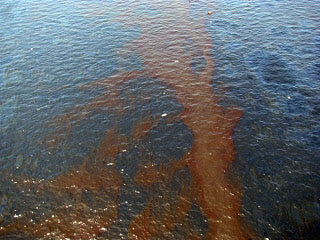May 19, Day 30 of a Gulf of Mexico oil spill that began with an explosion and fire April 20. Since then, oil has been pouring into the Gulf from a blown-out undersea well at a rate of at least 210,000 gallons per day.
Millions of gallons of crude are already in the water, however, and researchers said the black ooze may have entered a major current that could carry it through the Florida Keys and around to the East Coast.
"The fish are probably coming to the surface because they're dying from the oil," said Larry Schweiger, president and CEO of the National Wildlife Federation. "Those gulls think they're getting a free meal when really they're getting a load of toxins."
That spill was only roughly 190,000 gallons—or less in total than the ongoing BP spill in the Gulf of Mexico has gushed every day since April 20. The lightest parts of the current catastrophe may soon wash ashore from Louisiana to Alabama, and the thicker stuff is just a few kilometers behind at this point. So how long will the damage from this oil spill last?
"If the [oil] mousse gets into the marshes, it can last a real long time," says environmental chemist Jeffrey Short of environmental group Oceana, who has studied the aftereffects of the Exxon Valdez spill. "Once there's no oxygen, it doesn't break down fast at all; it's a long-term toxic reservoir."
"The toxic compounds in oil vary, but largely fall in the group known to chemists as polycyclic aromatic hydrocarbons (PAHs), such as napthalenes, benzene, toluene and xylenes. All are known human carcinogens with other health effects for humans, animals and plants. "These hydrocarbons are particularly relevant if inhaled or ingested," says environmental toxicologist Ronald Kendall of Texas Tech University. "In the bodies of organisms such as mammals or birds, these aromatic hydrocarbons can be transformed into even more toxic products, which can affect DNA." In other words, the effects of the oil spill will linger in the genetics of Gulf coast animals long after the spill is gone, resulting in mutations that could lead to problems ranging from reduced fertility to cancer."
"Fire boat response crews battle the blazing remnants of the offshore oil rig Deepwater Horizon April 21, 2010, after an explosion that remains under investigation. A Coast Guard MH-65C Dolphin rescue helicopter and crew document the fire aboard the mobile offshore drilling unit Deepwater Horizon. Multiple Coast Guard helicopters, planes and cutters responded to rescue the Deepwater Horizon's 126-person crew."

"Debris and oil from the Deepwater Horizon drilling platform float in the Gulf of Mexico after the rig sank April 22. The mobile offshore drilling platform had been engulfed in flames after the April 20 explosion."
They are taking great efforts to reduce the oil spill and contain the oil from spreading further. By using controlled fires, oil skimming and underwater robots to place a large containment dome over the well to halt the oil leakage and shut off valves the spill is being tended to but the spill has definitely not been contained, cleaned up or resolved.
http://www.scientificamerican.com/article.cfm?id=deepwater-coast-guard-images

